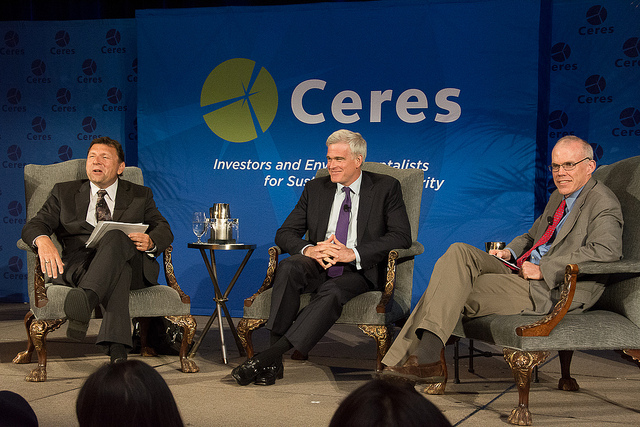Apr 23
20140
350.org / 1Sky, Carbon Markets | REDD, Ceres, Foundations, National Wildlife Federation, Natural Resources Defense Council, Non-Profit Industrial Complex, Sierra Club, Union of Concerned Scientists, World Resources Institute, World Wildlife Fund (WWF)
Breakthrough Strategies and Solutions Center for A New American Dream Divestment Ecological Solutions Friends of the Earth Green America National Wildlife Federation Natural Resources Defense Council NoVo Redefining Progress Sierra Club Tides Union of Concerned Scientists World Resources Institute World Wildlife Fund
McKibben’s Divestment Tour – Brought to You by Wall Street [Part IV of an Investigative Report] [Marketing a Fallacy]
April 23, 2014
Part four of an investigative series by Cory Morningstar
Divestment Investigative Report Series [Further Reading]: Part I • Part II • Part III • Part IV • Part V • Part VI • Part VII • Part VIII • Part IX • Part X • Part XI • Part XII • Part XIII
“Of all our studies, it is history that is best qualified to reward our research.” — Malcolm X
Prologue: A Coup d’état of Nature – Led by the Non-Profit Industrial Complex
It is somewhat ironic that anti-REDD climate activists, faux green organizations (in contrast to legitimate grassroots organizations that do exist, although few and far between) and self-proclaimed environmentalists, who consider themselves progressive will speak out against the commodification of nature’s natural resources while simultaneously promoting the toothless divestment campaign promoted by the useless mainstream groups allegedly on the left. It’s ironic because the divestment campaign will result (succeed) in a colossal injection of money shifting over to the very portfolios heavily invested in, thus dependent upon, the intense commodification and privatization of Earth’s last remaining forests, (via REDD, environmental “markets” and the like). This tour de force will be executed with cunning precision under the guise of environmental stewardship and “internalizing negative externalities through appropriate pricing.” Thus, ironically (if in appearances only), the greatest surge in the ultimate corporate capture of Earth’s final remaining resources is being led, and will be accomplished, by the very environmentalists and environmental groups that claim to oppose such corporate domination and capture.Beyond shelling out billions of tax-exempt dollars (i.e., investments) to those institutions most accommodating in the non-profit industrial complex (otherwise known as foundations), the corporations need not lift a finger to sell this pseudo green agenda to the people in the environmental movement; the feat is being carried out by a tag team comprised of the legitimate and the faux environmentalists. As the public is wholly ignorant and gullible, it almost has no comprehension of the following:
- the magnitude of our ecological crisis
- the root causes of the planetary crisis, or
- the non-profit industrial complex as an instrument of hegemony.
The commodification of the commons will represent the greatest, and most cunning, coup d’état in the history of corporate dominance – an extraordinary fait accompli of unparalleled scale, with unimaginable repercussions for humanity and all life.
Further, it matters little whether or not the money is moved from direct investments in fossil fuel corporations to so-called “socially responsible investments.” The fact of the matter is that all corporations on the planet (and therefore by extension, all investments on the planet) are dependent upon and will continue to require massive amounts of fossil fuels to continue to grow and expand ad infinitum – as required by the industrialized capitalist economic system.
The windmills and solar panels serve as beautiful (marketing) imagery as a panacea for our energy issues, yet they are illusory – the fake veneer for the commodification of the commons, which is the fundamental objective of Wall Street, the very advisers of the divestment campaign.
Thus we find ourselves unwilling to acknowledge the necessity to dismantle the industrialized capitalist economic system, choosing instead to embrace an illusion designed by corporate power.
The purpose of this investigative series is to illustrate (indeed, prove) this premise.
+++


















